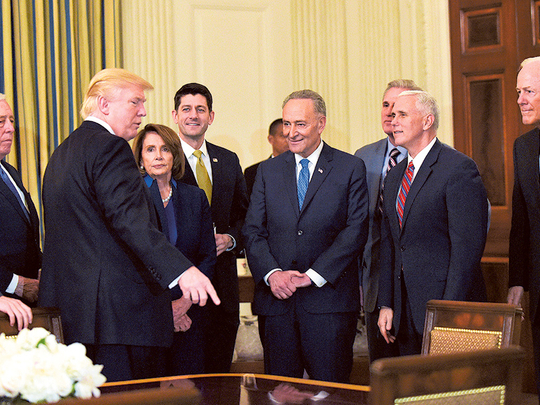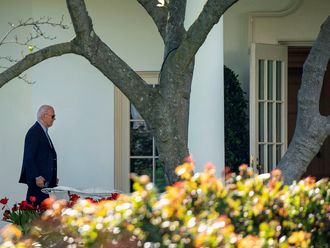
Washington: President Donald Trump used his first official meeting with congressional leaders on Monday to claim that millions of unauthorised immigrants had robbed him of a popular vote majority, a return to his obsession with the election’s results even as he seeks support for his legislative agenda.
The claim, which he has made before on Twitter, has been judged to be untrue by numerous fact-checkers. But the new president’s willingness to bring it up at Monday’s White House reception in the State Dining Room is an indication that he remains focused on his election even after assuming power.
Trump appears to remain concerned that the public will view his victory — and his entire presidency — as illegitimate if he does not repeatedly challenge the idea that Americans were deeply divided about sending him to the White House to succeed President Barack Obama.
Trump won 304 electoral votes to capture the presidency, but he fell almost 3 million votes short of Hillary Clinton in the popular vote. That reality appears to have bothered the president since Election Day, prompting him to repeatedly complain that adversaries were trying to undermine him.
Moving into the White House appears not to have tempered that anxiety. Several people familiar with the closed-door meeting Monday night, who asked to remain anonymous in discussing a private conversation, said Trump used the opportunity to brag about his victory.
As part of that conversation, Trump made the assertion about unauthorised immigrants voting in huge numbers for Clinton. That is similar to a Twitter message he posted in late November that said he would have won the popular vote “if you deduct the millions of people who voted illegally.”
Voting officials across the country have said there is virtually no evidence of people voting illegally, and certainly not millions of them. White House officials did not respond to requests for a comment on Trump’s discussion of the issue.
Representative Steny Hoyer, who attended the meeting, said on CNN that Trump also talked about the size of the crowd for his Inauguration Address.
“It was a huge crowd, a magnificent crowd. I haven’t seen such a crowd as big as this,” Hoyer told CNN, quoting Trump. He added that Trump did not “spend a lot of time on that, but it was clear that it was still on his mind.”
The president’s comments about the election results and his inauguration came as he gathered the bipartisan leadership of Congress for a White House reception. He also sought to build support for an ambitious legislative agenda despite days earlier castigating the very institution he needs to approve it.
Trump has said he intends to press Congress to move quickly on a repeal and replacement of Obama’s health care law, a large investment in the nation’s infrastructure, changes to the country’s immigration laws, and an overhaul of the tax system.
Republican senator John Cornyn called the meeting a “good sort of get-to-know-you session” and noted that “relationships count for a lot in this business.”
Cornyn said he thought such sessions would be more frequent during Trump’s time in office than it was during Obama’s tenure. Obama famously disliked spending social time with members of Congress.
Referring to Democrats, he said, “They said they’d never been over to the White House for anything like this before.”
Rep. Nancy Pelosi of California, the Democratic leader, said it was an “interesting” meeting. Along with health care and infrastructure, she said they discussed China and currency manipulation, as well as intellectual property right issues, which she said were a point of agreement.
“We talked about the Affordable Care Act and said what the Affordable Care Act has been successful in doing is improving quality, expanding access and lowering costs,” she told reporters. “And any proposal that they might have that does that — we’d be interested in hearing about.”












